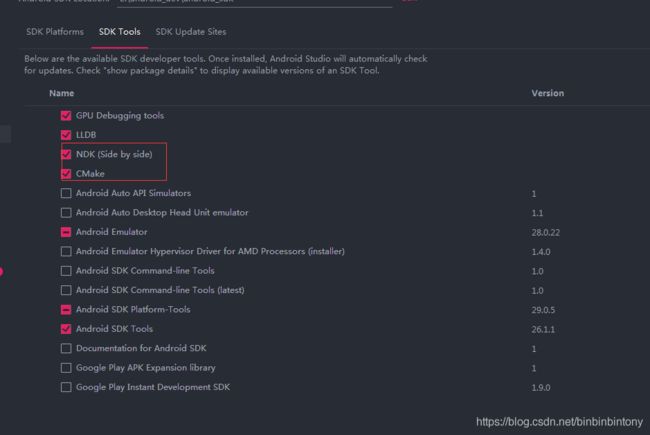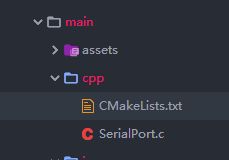android 项目串口通信(serialPort)开发遇到的炕
android 项目开发中使用到串口通信功能,在过程中遇到了一些炕。
一、首先要安装Cmake以及 ndk工具。

二、在跟main 目录下创建cpp 文件夹,以及CMakeLists.text 、SerialPort.c 文件

三、在CMakeLists.text 文件中编写生成动态so库
# For more information about using CMake with Android Studio, read the
# documentation: https://d.android.com/studio/projects/add-native-code.html
# Sets the minimum version of CMake required to build the native library.
cmake_minimum_required(VERSION 3.4.1)
# Creates and names a library, sets it as either STATIC
# or SHARED, and provides the relative paths to its source code.
# You can define multiple libraries, and CMake builds them for you.
# Gradle automatically packages shared libraries with your APK.
add_library( # Sets the name of the library.
native-lib
# Sets the library as a shared library.
SHARED
# Provides a relative path to your source file(s).
SerialPort.c
)
# Searches for a specified prebuilt library and stores the path as a
# variable. Because CMake includes system libraries in the search path by
# default, you only need to specify the name of the public NDK library
# you want to add. CMake verifies that the library exists before
# completing its build.
find_library( # Sets the name of the path variable.
log-lib
# Specifies the name of the NDK library that
# you want CMake to locate.
log)
# Specifies libraries CMake should link to your target library. You
# can link multiple libraries, such as libraries you define in this
# build script, prebuilt third-party libraries, or system libraries.
target_link_libraries( # Specifies the target library.
native-lib
# Links the target library to the log library
# included in the NDK.
${log-lib})
四、在SerialPort.c 文件中写调用jni 接口,一般都是使用android 标准串口。
/*
* Copyright 2009 Cedric Priscal
*
* Licensed under the Apache License, Version 2.0 (the "License");
* you may not use this file except in compliance with the License.
* You may obtain a copy of the License at
*
* http://www.apache.org/licenses/LICENSE-2.0
*
* Unless required by applicable law o0r agreed to in writing, software
* distributed under the License is distributed on an "AS IS" BASIS,
* WITHOUT WARRANTIES OR CONDITIONS OF ANY KIND, either express or implied.
* See the License for the specific language governing permissions and
* limitations under the License.
*/
#include
#include
#include
#include
#include
#include
#include
#include "android/log.h"
static const char *TAG="serial_port";
#define LOGI(fmt, args...) __android_log_print(ANDROID_LOG_INFO, TAG, fmt, ##args)
#define LOGD(fmt, args...) __android_log_print(ANDROID_LOG_DEBUG, TAG, fmt, ##args)
#define LOGE(fmt, args...) __android_log_print(ANDROID_LOG_ERROR, TAG, fmt, ##args)
static speed_t getBaudrate(jint baudrate)
{
switch(baudrate) {
case 0: return B0;
case 50: return B50;
case 75: return B75;
case 110: return B110;
case 134: return B134;
case 150: return B150;
case 200: return B200;
case 300: return B300;
case 600: return B600;
case 1200: return B1200;
case 1800: return B1800;
case 2400: return B2400;
case 4800: return B4800;
case 9600: return B9600;
case 19200: return B19200;
case 38400: return B38400;
case 57600: return B57600;
case 115200: return B115200;
case 230400: return B230400;
case 460800: return B460800;
case 500000: return B500000;
case 576000: return B576000;
case 921600: return B921600;
default: return -1;
}
}
/*
* Class: cedric_serial_SerialPort
* Method: open
* Signature: (Ljava/lang/String;)V
*/
JNIEXPORT jobject JNICALL Java_com_serialPort_SerialPort_open
(JNIEnv *env, jobject thiz, jstring path, jint baudrate)
{
int fd;
speed_t speed;
jobject mFileDescriptor;
/* Check arguments */
{
speed = getBaudrate(baudrate);
if (speed == -1) {
return NULL;
}
}
/* Opening device */
{
jboolean iscopy;
const char *path_utf = (*env)->GetStringUTFChars(env, path, &iscopy);
LOGD("Opening serial port %s", path_utf);
fd = open(path_utf, O_RDWR | O_SYNC);
LOGD("open() fd = %d", fd);
(*env)->ReleaseStringUTFChars(env, path, path_utf);
if (fd == -1)
{
/* Throw an exception */
LOGE("Cannot open port");
/* TODO: throw an exception */
return NULL;
}
}
/* Configure device */
{
struct termios cfg;
LOGD("Configuring serial port");
if (tcgetattr(fd, &cfg))
{
LOGE("tcgetattr() failed");
close(fd);
/* TODO: throw an exception */
return NULL;
}
cfmakeraw(&cfg);
cfsetispeed(&cfg, speed);
cfsetospeed(&cfg, speed);
if (tcsetattr(fd, TCSANOW, &cfg))
{
LOGE("tcsetattr() failed");
close(fd);
/* TODO: throw an exception */
return NULL;
}
}
/* Create a corresponding file descriptor */
{
jclass cFileDescriptor = (*env)->FindClass(env, "java/io/FileDescriptor");
jmethodID iFileDescriptor = (*env)->GetMethodID(env, cFileDescriptor, "", "()V");
jfieldID descriptorID = (*env)->GetFieldID(env, cFileDescriptor, "descriptor", "I");
mFileDescriptor = (*env)->NewObject(env, cFileDescriptor, iFileDescriptor);
(*env)->SetIntField(env, mFileDescriptor, descriptorID, (jint)fd);
}
return mFileDescriptor;
}
/*
* Class: cedric_serial_SerialPort
* Method: close
* Signature: ()V
*/
JNIEXPORT void JNICALL Java_com_serialPort_SerialPort_close
(JNIEnv *env, jobject thiz)
{
jclass SerialPortClass = (*env)->GetObjectClass(env, thiz);
jclass FileDescriptorClass = (*env)->FindClass(env, "java/io/FileDescriptor");
jfieldID mFdID = (*env)->GetFieldID(env, SerialPortClass, "mFd", "Ljava/io/FileDescriptor;");
jfieldID descriptorID = (*env)->GetFieldID(env, FileDescriptorClass, "descriptor", "I");
jobject mFd = (*env)->GetObjectField(env, thiz, mFdID);
jint descriptor = (*env)->GetIntField(env, mFd, descriptorID);
LOGD("close(fd = %d)", descriptor);
close(descriptor);
}
五、创建Serialport文件:
* Copyright 2009 Cedric Priscal
*
* Licensed under the Apache License, Version 2.0 (the "License");
* you may not use this file except in compliance with the License.
* You may obtain a copy of the License at
*
* http://www.apache.org/licenses/LICENSE-2.0
*
* Unless required by applicable law or agreed to in writing, software
* distributed under the License is distributed on an "AS IS" BASIS,
* WITHOUT WARRANTIES OR CONDITIONS OF ANY KIND, either express or implied.
* See the License for the specific language governing permissions and
* limitations under the License.
*/
import android.util.Log;
import java.io.File;
import java.io.FileDescriptor;
import java.io.FileInputStream;
import java.io.FileOutputStream;
import java.io.IOException;
import java.io.InputStream;
import java.io.OutputStream;
public class SerialPort {
private static final String TAG = "SerialPort";
/*
* Do not remove or rename the field mFd: it is used by native method close();
*/
private FileDescriptor mFd;
private FileInputStream mFileInputStream;
private FileOutputStream mFileOutputStream;
public SerialPort(File device, int baudrate) throws SecurityException, IOException {
/* Check access permission */
// if (!device.canRead() || !device.canWrite()) {
// try {
// /* Missing read/write permission, trying to chmod the file */
// Process su;
// su = Runtime.getRuntime().exec("/system/xbin/su");
// /*String cmd = "chmod 777 " + device.getAbsolutePath() + "\n"
// + "exit\n";*/
// String cmd = "chmod 777 /dev/ttyS4" + "\n"
// + "exit\n";
// su.getOutputStream().write(cmd.getBytes());
// if ((su.waitFor() != 0) || !device.canRead()
// || !device.canWrite()) {
// throw new SecurityException();
// }
// } catch (Exception e) {
// e.printStackTrace();
// throw new SecurityException();
// }
// }
//
mFd = open(device.getAbsolutePath(), baudrate, 0);
if (mFd == null) {
Log.e(TAG, "native open returns null");
throw new IOException();
}
mFileInputStream = new FileInputStream(mFd);
mFileOutputStream = new FileOutputStream(mFd);
}
public InputStream getInputStream() {
return mFileInputStream;
}
public OutputStream getOutputStream() {
return mFileOutputStream;
}
private native static FileDescriptor open(String path, int baudrate);
public native void close();
public native static FileDescriptor open(String path, int baudrate, int flags);
}
要注意文件路径创建要跟jni调用路径一直否则调用不到,出现找不到方法的异常,特别是编译好so库之后,给第三方使用要注明
六、读取线程
class ReadThread extends Thread{
@Override
public void run() {
super.run();
byte[] bytes = new byte[1024];
while (!isInterrupted()){
int size = 0;
try {
if (mInputStream != null) {
if (mInputStream.available() > 0 ) {
SystemClock.sleep(2);
try {
size = mInputStream.read(bytes);
if (size > 0) {
Log.i("SerialPort_test","==== " + bytes );
}
} catch (IOException e) {
e.printStackTrace();
}
}
}
} catch (Exception e) {
e.printStackTrace();
}
}
}
}
**在通信过程中如数据比较大,可以会遇到数据读取不完整,感觉有掉帧一样,执行mInputStream.available(),这时可以在读取之前先延时一段时间,再一次文件流读取数据,
避免数据的错乱,接着过滤协议数据。
**读线程所在的类实例最好是一个单列模式,以避免多线程操作创建不同的对象,否则会读取到数据也跟掉帧一样,多线程并发还是要注意的!!!